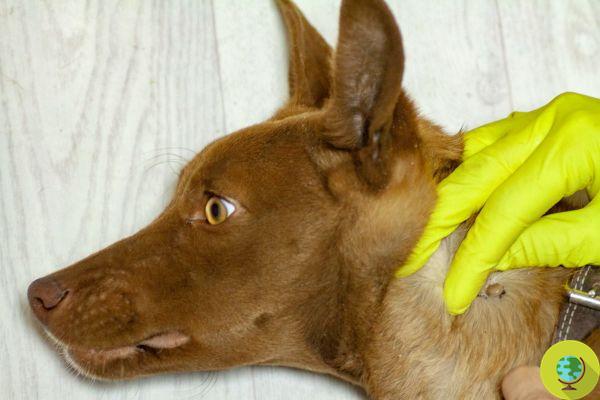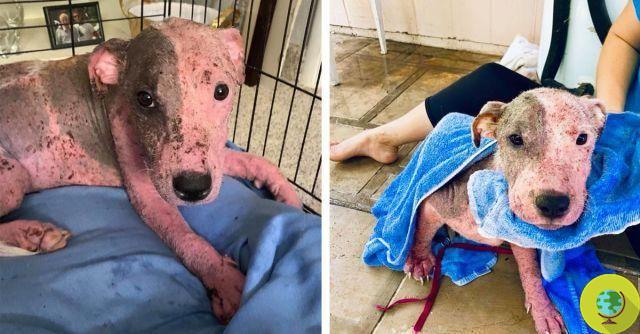The summer and spring months can turn into torture for cats and dogs due to flea and tick infestations. What can be done to minimize this risk and how to act to eliminate these parasites from the skin of our four-legged friends? Here are the advice of Dr. Anna Chiara Peluso, "our" trusted veterinarian
He is about to end up run over, his mother saves him
With the summer, two of the biggest nightmares for those who have come back pets: the fleas and ticks. It is often mistakenly assumed that this threat is limited to the summer months only. In reality, due to the climatic crisis and the consequent increase in temperatures, these parasites are increasingly widespread and resistant even in spring.
In addition to being a major nuisance for dogs and cats and causing burning and itching, fleas and ticks can cause serious diseases, which in some cases prove to be fatal. As is well known, these small creatures penetrate the skin of animals and feed on their blood. And through their saliva (to which our four-legged friends are very often allergic) they can transmit pathogens that should not be underestimated such as endoparasites, bacteria and protozoa. So what can we do to protect our furry pets? Providing us with some valuable advice is the veterinary from Lecce Anna Chiara Peluso, who is also a loyal reader of ours.
The only way we can protect pets from vector-borne diseases known as VBD is to use pesticides with repellent properties; moreover, it is important to choose a product that is also effective against eggs and larvae present in the environment in which the animal lives. - explains Dr. Peluso - There are many pesticides on the market, of many brands and with different formulations: spot-on pipettes, sprays, tablets and collars. Each drug has its field of action, its duration, its effectiveness, but also its limits. It is therefore advisable to consult with your veterinarian to find the most suitable solution for your animal based on its degree of exposure to risks and its lifestyle.
How to choose a good pesticide
Before buying pesticides, however, it is necessary to consider some factors to avoid consequences, as pointed out by the expert:
It is very important to pay attention to the target that each drug has and to the dosage. Many pesticides that target the dog are toxic and lethal to cats, while a drug used for an adult animal may not work well on a pregnant animal or even worse on a puppy. There are also formulations based on natural substances on the market that have a good efficacy flanked by greater safety for humans, the animal itself and the environment.
What to do in case of flea infestation in your pets?
To control flea infestation it is essential to treat all animals that live together and not limit the treatments to the summer period, but continue them throughout the year as fleas can survive and replicate very well in the home during the winter period (constant presence of ideal temperature and humidity). - underlines the veterinarian - Animals that live exclusively in the apartment should also be treated (balconies, windows, our shoes, are entrance doors for parasites and their eggs).
Pay attention to the removal of ticks and avoid do-it-yourself remedies

©mironovm/123rf
If, on the other hand, our four-legged friend has been attacked by ticks it is essential to try to remove them very carefully, without relying on do-it-yourself remedies, which can be counterproductive.
If you were to find the presence of ticks on the skin of the animal, it must be remembered that their removal is quite complex because they stick tenaciously and it can also happen that the dog or the owner remove the body of the parasite leaving the head stuck in the skin. - explains Dr. Peluso - In this case, a small wound remains that can give rise to a local infection, an ulcer or a lump. Never use alcohol or other home remedies for removal! The tick should not be "stressed" during the procedure because there is a risk of causing a regurgitation of the blood meal and with it also of pathogens if present in it! It is therefore good if you are not practical to seek the help of the veterinarian. It is also necessary to remember, if spot-on pesticides are used, not to treat the animals in conjunction with the bath but at a distance of at least 5 days before or after washing to ensure the effectiveness of the product.
Follow your Telegram | Instagram | Facebook | TikTok | Youtube
You may also be interested:
- You must never use olive oil to remove ticks from dogs
- Beware of ticks! They are very adept at hiding. Always check also in the mouth of your four-legged friends


























